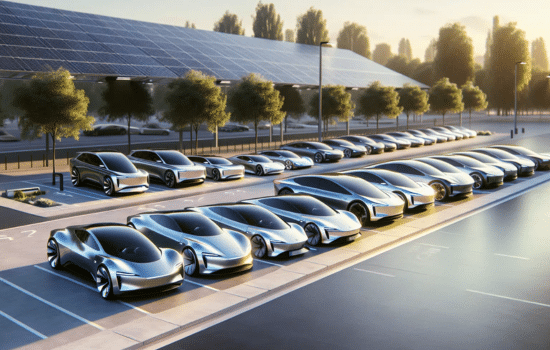Advertisements
In a world where climate change and fuel costs are growing concerns, choosing an efficient vehicle has become a priority.
Finding out which cars combine lower fuel consumption with reduced environmental impact is crucial to making informed decisions.
Advertisements
This guide presents a list of the 10 most fuel-efficient vehicles, highlighting how these models not only lighten the consumer's pocket, but also contribute to a greener future.
This analysis focuses on vehicles that have been evaluated for their exceptional performance in terms of energy efficiency.
In addition, aspects such as the type of engine, whether hybrid, electric or optimized combustion, are explored, as well as how these technologies contribute to reducing carbon emissions.
Advertisements
From compacts to SUVs, these models offer a variety of options for different needs and lifestyles, proving that it is possible to enjoy good performance without sacrificing environmental awareness.
Taking a more sustainable approach not only benefits the environment, but also represents a smart long-term investment.
See also:
- Top 10 Gas Guzzlers
- Find treasures with our detector app
- Voice Changing Apps Using Artificial Intelligence
- Top 10 Most Fuel-Efficient Popular Cars
- Free application to repair motorcycles
As fuel prices fluctuate and environmental regulations tighten, having an efficient vehicle can be a key differentiator.
By opting for one of these models, drivers not only become pioneers of sustainable mobility, but also experience significant savings in fuel costs.
This commitment to efficiency and care for the planet is a growing trend, and here are the models that lead this change towards a more responsible future.
The importance of fuel efficiency
To begin with, understanding the importance of fuel efficiency is crucial in our current world.
With the constant rise in fossil fuel prices and growing environmental concerns, the demand for efficient vehicles has escalated significantly.
A fuel-efficient car not only helps save money, but also reduces your carbon footprint, thus contributing to the fight against climate change.
Furthermore, fuel efficiency has become a determining criterion for many buyers. Advances in technology have allowed car manufacturers to create vehicles that offer exceptional performance without compromising on efficiency.
Consequently, by choosing an efficient vehicle, consumers can enjoy more economical travel while contributing to environmental sustainability.
On the other hand, government policies in many parts of the world are also driving the need for efficient vehicles.
Stricter emissions regulations and incentives to buy eco-friendly cars have made more people consider these factors when purchasing. Therefore, fuel-efficient vehicles are not just a trend, but a necessity.
Factors that influence fuel efficiency
First of all, it is essential to understand the factors that influence fuel efficiency. The aerodynamics of a vehicle play a crucial role.
More aerodynamic designs reduce air resistance, allowing the car to move more easily through the atmosphere, requiring less energy to do so. This factor is particularly important for vehicles operating at highway speeds.
Vehicle weight also significantly affects fuel consumption. The lighter a car is, the less energy is needed to move it.
For this reason, manufacturers are using lighter materials, such as aluminum and carbon fiber, instead of traditional steel to build vehicle chassis.
In addition, the type of engine also impacts efficiency. Hybrid and electric engines are known for their high energy efficiency compared to traditional internal combustion engines.
These hybrid systems combine electric motors with combustion engines to optimize energy use, while electric vehicles completely eliminate the need for fossil fuels.
The 10 most fuel-efficient vehicles
Now, let's explore the 10 most fuel-efficient vehicles available on the market. These models not only promise to save on gas costs, but are also a greener option.
- Toyota Prius: Renowned for its hybrid efficiency, the Prius remains a leader in fuel economy, combining a gasoline engine with an electric motor.
- Honda Insight: Another hybrid that stands out for its aerodynamic design and efficient engine technology.
- Hyundai Ioniq: Available in hybrid and electric versions, the Ioniq offers impressive fuel economy.
- Kia Niro: This hybrid combines crossover design with class-leading fuel efficiency.
- Chevrolet Bolt EV: As a fully electric vehicle, the Bolt eliminates the need for gasoline entirely, providing considerable range.
- Ford Fusion Hybrid: A hybrid sedan that combines comfort and efficiency in an attractive package.
- Nissan Leaf: A pioneer among electric vehicles, the Leaf offers a zero-emissions alternative with a range suitable for most drivers.
- BMW i3: With its distinctive design and electric powertrain options, the i3 is a luxury choice with efficiency in mind.
- Hyundai Kona Electric: It offers exceptional range and zero emissions, ideal for the environmentally conscious driver.
- Volkswagen ID.4: An electric SUV that combines space, comfort and energy efficiency.
Economic benefits of efficient vehicles
Therefore, opting for fuel-efficient vehicles brings with it significant economic benefits. Firstly, drivers can notice a significant decrease in fuel costs.
Over time, the savings on gas can offset the higher initial investment that some of these vehicles typically require.
Additionally, many countries offer tax incentives for purchasing eco-friendly cars. These incentives may include tax credits, discounts on vehicle registration, or even cash rebates.
Such financial benefits can make the transition to an efficient vehicle more attractive to consumers.
Additionally, electric and hybrid vehicles are often less expensive to maintain compared to traditional cars.
Since electric motors have fewer moving parts, there is less chance of wear and tear and mechanical failure. This factor contributes to further reducing the overall costs of the vehicle in the long run.
Environmental impact of efficient vehicles
In terms of environmental impact, efficient vehicles play a vital role in reducing pollution.
By consuming less fuel, these cars emit fewer greenhouse gases, which helps combat climate change.
This benefit is especially noticeable in urban areas, where air pollution is a significant problem.
In addition, electric vehicles completely eliminate tailpipe emissions, meaning they do not produce harmful pollutants such as sulfur dioxide or carbon monoxide. This aspect is crucial to improving air quality and protecting public health.
Furthermore, reducing dependence on fossil fuels reduces the exploitation of natural resources, which contributes to the preservation of delicate ecosystems.
In short, efficient vehicles are a powerful tool to promote a more sustainable and healthier future for our planet.
Technology and applications to improve efficiency
In addition to choosing an efficient vehicle, there are technologies and applications that can help further improve fuel efficiency.
Apps like Fuelio and GasBuddy allow drivers to monitor their fuel consumption and find the most affordable gas stations nearby. These tools are especially useful for maximizing fuel savings.
Furthermore, many modern cars come equipped with navigation systems that suggest more efficient routes, avoiding traffic and minimizing travel time.
Also, driver assistance systems such as adaptive cruise control can optimize fuel consumption by maintaining a constant speed and avoiding sudden acceleration and braking.

Conclusion
In conclusion, opting for one of the 10 most fuel-efficient vehicles represents a smart decision both economically and environmentally.
By investing in an efficient car, consumers not only experience significant savings in fuel costs, but also actively contribute to reducing their carbon footprint. This is a crucial step in the fight against climate change and in promoting a healthier environment.
Furthermore, with the support of government policies that encourage the purchase of eco-friendly vehicles, the transition to more sustainable options becomes even more attractive.
Tax incentives and reductions in maintenance costs make these vehicles a financially viable option in the long term.
Technology also continues to innovate to improve the efficiency of these cars, with applications that optimize consumption and intelligent navigation systems that propose more efficient routes.
Ultimately, efficient vehicles are more than just a fad; they are an imperative need in the current environmental context.
Choosing one of these models not only benefits the vehicle owner in economic terms, but also plays a crucial role in protecting the environment.
Therefore, when considering the purchase of a new car, fuel efficiency should be a determining factor, thus contributing to a more sustainable and planet-conscious future.




